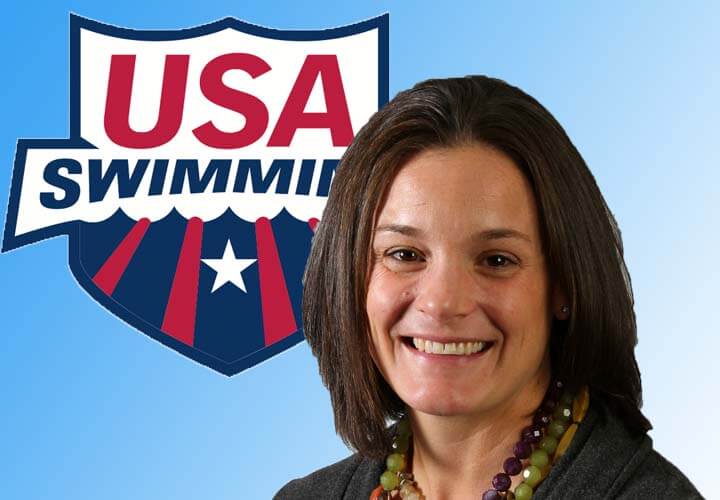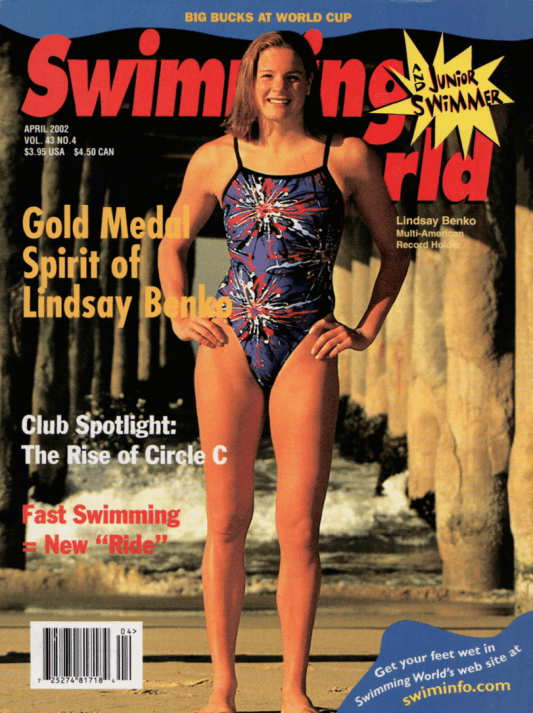Lindsay Mintenko Prepared for Challenge of Managing USA National Team

By David Rieder.
Unlike recent predecessor Frank Busch, USA Swimming National Team Managing Director Lindsay Mintenko is not, by trade, a swim coach.
Busch was the head coach at the University of Arizona for 22 years, leading the Wildcats to a pair of NCAA titles in 2008. In contrast, the coaching experience on Mintenko’s résumé is the five years she spent as an assistant under Mark Schubert at USC, which overlapped with her career as a professional swimmer.
Then known as Lindsay Benko, she was one of the best in the world in the 100 and 200 freestyle during the early 2000s. After winning five NCAA titles while at USC, Benko won a pair of Olympic gold medals as a part of American women’s 800 free relay squads in 2000 and 2004. She also won three individual golds during her career at the Short Course World Championships.
And since 2006, she’s been the No. 2 figure leading the National Team, first behind Schubert and later Busch, operating mostly behind the scenes. Now, even though her title won’t change, Mintenko is ascending to the No. 1 spot.
The job is much the same as the one she stepped into more than a decade ago, one which prepared her for the promotion better than any time spent coaching could have. The main difference: she will be more visible, both to the public and to the athletes and coaches representing the United States.
“I think there’s a little more leadership I’m going to be providing, especially in team meetings and stuff like that,” Mintenko said, “but a lot of what I’ll be doing is what I’ve been doing for the past 11 years, just more in a leadership role and more involved and more decision-making.”
Of course, Mintenko has been plenty involved over the past 11 years, including helping to lead a massive internal audit after the Rio Olympics where Olympic athletes and coaches as well as athletes’ personal coaches were all interviewed.
“It ended up being a much bigger project than we thought it was going to be,” Mintenko said, laughing.
A common refrain from that audit: “We need to make our events more exciting.” And that led directly to the changes to USA Swimming’s Pro Swim Series, where knockout-style 50s, a mystery 200 IM and a mixed medley relay will all be included in three of this year’s meets.
No, Mintenko’s expertise is not as a coach, but there’s no hands-on coaching involved in her job. After announcing his plans for retirement earlier this year, Busch explained that “I felt like my job was not to coach athletes anymore.” Instead, he was and Mintenko now is in a position to help and to serve.
“I would never tell a coach what to do with their athlete. My job is to say, ‘If you have any questions, we’ll talk about it. What support can I give to help you with your athlete to get better, to take the next step?’” Busch said. “You have to understand that we are a service industry, and the more we serve, the better our chance for success.”
Mintenko’s goals, as she explained them just a few days after her promotion was announced? Almost the same.
“I just want to support the athletes and coaches,” she said. “That’s what our job is. Help them be the best they can be so when it comes time to do their job when they get up on the blocks, they can do it without any distractions.”
What Busch offered in coaching experience, Mintenko has competitive experience. Her leadership style likely will be much different, in part because she is much closer in age to most of the team than Busch was.
In fact, two of Mintenko’s teammates from the 2004 Olympics, Dana Vollmer and Ryan Lochte, are still active swimmers, while Michael Phelps and Natalie Coughlin have only recently stepped away from the pool.
But as much as she can, Mintenko wants to keep the status quo. After all, why fix what isn’t broken? As Busch put it, any job at USA Swimming is a “performance-based operation,” and performances have been strong as of late: 32 medals, 16 of them gold, at the Rio Olympics, and a record-tying 38 medals, 18 of them gold, at this summer’s World Championships in Budapest.
Mintenko has every intention of keeping the infrastructure that helped produce those medals in place—except, of course, Busch.
“We have a great group of people that work in the National Team division, so I don’t expect that changing by any big means or anything like that,” Mintenko said. “I may have a different take on it, but Frank and I worked really well together for many years, so I don’t expect massive changes to come anytime soon.
“And we’ve already started the process for 2020, so I don’t anticipate that changing, either,” she added.
After Mintenko’s promotion was announced, the reaction was unanimously positive, and Mintenko was getting more public attention than she had at any point since retiring after the 2004 Olympics. And all that made Mintenko feel a bit uncomfortable but no less prepared for the job standing in front of her.
“It’s not me, first of all. I like the behind-the-scenes work,” she said. “I’m very flattered by the people who are supporting me. I’m very blessed by the people who are supporting me. But I know that this role comes with challenges, and I’m willing to take them on.”




